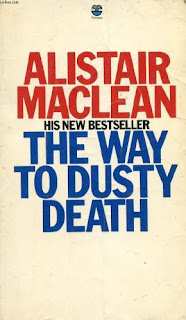 |
| I found the worst cover ever for this book |
I have avoided Maclean's books simply because they were too popular. This is not just elitist snobbery on my part (though that is a factor), but generally massive mainstream sellers in any genre tend to be the most dumbed down of that genre with bad writing (cough cough Kathy Reichs cough Jeffrey Deaver cough and on and on). What surprised me about this book was how shoddy it all was. I don't know what period of his career it took place or what was going on then, but this book feels like it was cranked out overnight and not edited at all. There is just a lot of really awkward language and scenes where you actually can't quite tell what is going on. The plot is also badly constructed and when the reveal happens, it's super lame and not thoroughly explained. Despite all that, the initial setup is quite gripping and there is some minor masculine heroic behaviour that is satisfying (although the protagonist is a total machine and fundamentally superior to everyone around so that there is little suspense once you figure that out).
The story starts out in medias res with the flaming wreckage of an ugly Grand Prix crash. The protagonist is the best driver who was thrown from his car and watches in a daze the burning body of the guy he just knocked off the road. We learn quickly that his brother died a month ago and that he has become reckless and may even be drinking (this is a big deal in Gran Prix driving, I guess). The first chapter portrays him as a total wreck, but there are weird little tells, such as him washing his mouth out with whiskey in his hotel room later then spitting it out. Soon after, he is seen spying on the team owner and the mechanic while they check out his car and you realize that there is a greater game afoot. (This scene is one where I didn't even realize he was supposed to be hiding at first because of the weird way it was written so though the other two characters knew he was in the room.) This part is cool and you definitely want to find out what's going on.
If you have read my reviews, you know my taste and that I am very patient with certain kinds of clichés and silliness in men's action fiction. Look, I get chills watching the trailer for The Equalizer 2. I'm an easy mark. I gotta say, I was really not impressed with Maclean with this book. Desmond Bagley crushes him. Yes, he has a similarily macho simplicity, but his characters make sense and they get really challenged, plus he writes well, clearly with punch. Maybe this was on the lower end of Maclean's massive output. They are easy to read, so I will give him another try.




